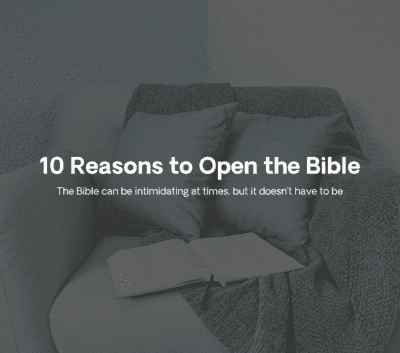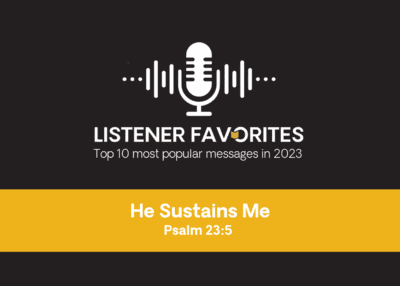It’s so comforting to know that God is working all things for our good, isn’t it? That is, until we realize that his idea of good is often very different than our own.
We’ve all experienced this at some point. Perhaps we have prayed for something, only to receive the very opposite of what we’ve longed for. At other times, a path we’ve pursued with great energy suddenly redirects, or an expectation we’ve had unravels before our eyes.
These experiences form crossroads that all Christians will eventually face. When our untested faith in God’s goodness is suddenly challenged, we’re left with the question–
How can I believe God works for my good when what he’s allowing seems far from it?
Lately, as I’ve freshly wrestled with this question, I’ve meditated on a verse we often run to–and often misunderstand:
And we know that for those who love God all things work together for good, for those who are called according to his purpose. (Romans 8:28)
As we read this verse, we first have to understand what Paul means when he says, “for those who love God all things work together for good.” What is our good and what is his purpose? To answer that, we have to look at the verses that follow:
For those whom he foreknew he also predestined to be conformed to the image of his Son, in order that he might be the firstborn among many brothers. And those whom he predestined he also called, and those whom he called he also justified, and those whom he justified he also glorified. (Romans 8:29-30)
In other words, the “good” God has promised his children is to conform them to the image of Christ, for the purpose of bringing himself glory.
So here’s the encouragement for us if we’re facing circumstances that seem far from good: God is using our afflictions to produce the good we would desire had sin not blinded our hearts and minds. Here are three ways God uses affliction for our good and his purposes.
He exposes what we love.
Do not love the world or the things in the world. If anyone loves the world, the love of the Father is not in him. For all that is in the world—the desires of the flesh and the desires of the eyes and pride of life—is not from the Father but is from the world. (1 John 2:15-16)
God is a jealous God. He loves us too much to allow us to settle our heart’s affections on the world. Therefore, he uses our trials to test our faith and challenge what and who we really love most. For those who love God, affliction serves as a chiseling tool in the hand of our Divine Sculptor, chipping away at all that competes for our affections. Gradually, in his severe mercy, he chips away “good things” from our life to loosen our grip on our earthly home, to fill our empty hands with more of himself, and to draw us heavenward.
He does not remove anything from us that he will not abundantly replace with something far greater than we ever could have imagined. God truly is working all things together for the good, the eternal good, of those who love him.
He humbles us.
Humble yourselves, therefore, under the mighty hand of God so that at the proper time he may exalt you. (1 Peter 5:6)
Suffering wakes us up to our frailty and sinfulness. While we may have been able to live under the smoke screen of our outward goodness and perceived control for a time, suffering opens our eyes to reality. When affliction presses in on us, it brings us low and reveals what’s truly in our hearts. As discouraging as this can be, God uses it for our good to reveal how desperately sick we are apart from his grace. Through it God shows how miraculous and magnificent salvation in Christ truly is.
Over time, as the Spirit humbles us under God’s mighty hand, our plea for changed circumstances begins to lessen and our plea for changed hearts begins to increase. That is truly a mark of God’s faithfulness to his promise to work all things together for the good of those who love him.
He loves us far too much to settle for giving us temporary comforts and pain-free lives that blind us to our need for him. God knows that the short-term trials of this life are not worth comparing to the treasures that await us for all eternity in his presence.
He points us to the cross.
But it was the LORD’s good plan to crush him and cause him grief. Yet when his life is made an offering for sin, he will have many descendants. He will enjoy a long life, and the LORD’s good plan will prosper in his hands. (Isaiah 53:10)
Joni Eareckson Tada said, “God permits what he hates to accomplish what he loves.” There is no greater evidence of this than the cross of Jesus Christ. God permitted what he hates–the sacrifice of his Son–to accomplish what he loves–salvation for all who will put their trust in him.
As Christians, we need to look at the words of Romans 8:28 through the lens of the cross. If we assume that it means God is working through all things to bring about a comfortable, prosperous, pain-free life on earth, we will quickly question his love, faithfulness, and goodness. And we certainly won’t follow him for long. But if we grasp that the “good” he promised us is rooted in the same good brought about through the cross, we will humbly submit ourselves to what he allows, trusting that our suffering, though painful in the moment, is working for our eternal good. Namely, to reflect the image of Christ.
This is the greatest good that God can bring about in our lives. Not only to transform us into the image of Christ, but to change our heart’s desires to align with his.
The deepest joy I’ve experienced in my life has come through God removing many “good” things from my life and opening my eyes to how much I seek joy and satisfaction in things apart from him. It has brought about greater awareness of how undeserving I am of his forgiveness and how sinful I am apart from his grace.
Look to the Cross
Brother or sister, what are you facing that feels far from good? Look to the cross and remember that things aren’t always as they seem. As Randy Alcorn said:
Good Friday isn’t called bad Friday because we see it in retrospect: We know that out of the appalling bad came inexpressible good. And that good trumps the bad. Although the bad was temporary, the good was eternal. If someone had delivered Jesus from his suffering, Jesus could not have delivered us from ours.
Let’s look to Christ in whatever circumstances we are facing. We can trust that he will be faithful to his promise. He’ll work all things together for the good of those called according to his purpose. And this will be for our joy and for his glory.






